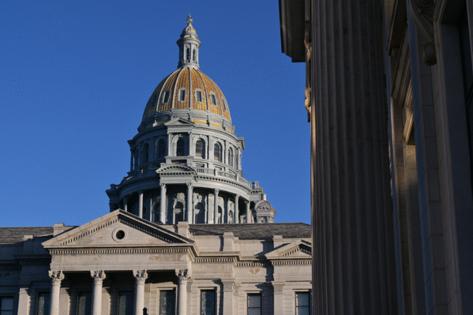Immigration bill, childhood sexual abuse amendment and veto override up in Colorado Legislature this week
Published in News & Features
DENVER — With just over two weeks to go in the 120-day Colorado legislative session, lawmakers are looking to push forward proposals that would increase protections for undocumented immigrants, study a statewide universal health care system and, possibly, result in the first veto override of Gov. Jared Polis’ tenure.
On Monday, the Senate is planning to take a formal vote on Senate Bill 276, a proposal to expand protections for undocumented immigrants and limit where federal authorities can operate in the state. Assuming it passes in the Democrat-controlled chamber, it will still need to pass a House committee vote and full floor votes in the second chamber before it goes to Polis for consideration.
The timing of hearings and votes is always subject to change. In the final dash of the session — before sine die on May 7 — it becomes even more tentative as the days grow longer and unexpected debates can throw plans for a loop.
Here is what else is scheduled this week:
Childhood sexual assault, abortion bills
The Senate is also set to debate Monday a referred amendment to the Colorado Constitution. It’s one that, if approved by voters, would allow future legislators to pass laws allowing survivors of childhood sexual abuse to file civil lawsuits against perpetrators and enablers, regardless of when the abuse happened.
A similar effort last year failed on a party-line vote, with all Republicans against. The chamber has an identical partisan split this year, and referring the measure to the ballot requires two-thirds support.
On Tuesday, the Senate is set to take up Senate Bill 130, the final bill in a three-bill package aimed at increasing protections for abortion providers and access for people needing reproductive health care. The bill is aimed at to protecting access to emergency medical services, including abortion care. It was drafted in response to instances in which some hospitals and emergency rooms had declined the care, or delayed it to the detriment of the mother’s health.
The other two bills — Senate Bill 183, which would enact voter-approved changes to the state constitution enshrining abortion rights and would require public funding of the procedure for Medicaid patients and public employees; and Senate Bill 129, which would protect telehealth providers of abortion care — have already passed both legislative chambers.
Single-payer health care study
In the House, members are scheduled to debate on Monday a bill requiring the study of a statewide single-payer health care system. It would be paid for with private donations.
Senate Bill 45 already passed the Senate on a near-party-line vote, but with a twist: Sen. Cleave Simpson, an Alamosa Republican, joined Democrats in voting aye — but with the stated hope that the study would finally put an end to the recurring debates about whether Colorado should move toward a universal health care system.
TABOR lawsuit
The entire House is also scheduled Monday to debate House Joint Resolution 1023, a proposed state-led lawsuit challenging the constitutionality of the Taxpayer’s Bill of Rights, or TABOR. Backers of the measure argue TABOR — a voter-approved amendment in the state constitution — violates other requirements in the U.S. and Colorado constitutions that the state have a republican form of government.
It is part of a broader push to reform TABOR as Medicaid and education costs, in particular, crash into the cap on state spending growth set by the amendment.
Polis’ first veto override?
On Monday, the Senate is set to consider overriding Polis’ first veto of this year’s legislative session — a move that, if successful, would also be the first time the legislature has overruled one of the current governor’s vetoes.
Polis last week vetoed Senate Bill 77, which sought to make changes to the state’s open records law. He objected to two provisions in particular: It would have given governments more time to respond to requests if officials determined they were for financial gain, and also would have given journalists priority in fulfilling requests. The latter would have let governments determine who qualifies as a journalist and created two classes of public records seekers.
Two-thirds of the Senate and the House must approve overriding the veto to make the bill law. The bill cleared that margin in its final vote in each chamber before it went to the governor.
------------
©2025 MediaNews Group, Inc. Visit at denverpost.com. Distributed by Tribune Content Agency, LLC.







Comments